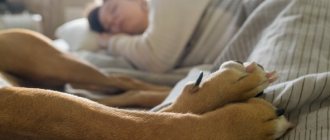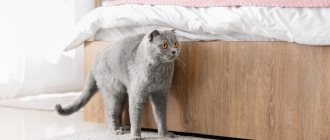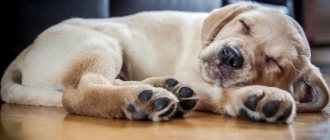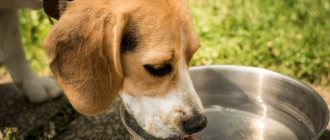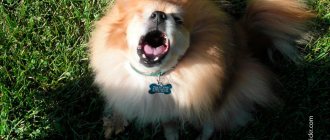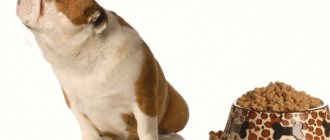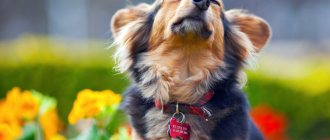In the first weeks of life, the puppy spends most of its time sleeping. The length of sleep depends largely on the sensations provided and the level of activity, but regardless of this, young dogs sleep much longer than older dogs. How long should a puppy sleep? You will find out the answer in the article.
Puppies, like small children, sleep for a significant part of the day. Prolonged sleep is necessary for the proper development and restoration of the body. Owners of young dogs must remember to provide their dogs with adequate rest conditions.
How many hours does a puppy sleep?
Sleep is just as important for a dog as it is for a person. The time allotted to it is largely determined by the age of the four-legged animals. Puppies, like small children, sleep longer than mature dogs. How long does a puppy sleep?
Newborn quadrupeds sleep up to 90% of the day. Growing puppies can sleep 15-18 hours, which is approximately 3/4 of the day. As they mature, they will sleep less and less.
Your puppy may also have a knack for falling asleep suddenly, sometimes during other activities such as eating or playing. Although this sudden drowsiness may be surprising, there is usually no need to worry. Especially in the first year of life, your baby will be more active (especially the things puppies love to do, which is running, jumping, scratching and chewing), interspersed with frequent naps.
The more active your puppy is, the more sleep he will need. As your puppy gets older, he will sleep less and less. But even adult dogs sleep a lot, on average sleeping 50-65% of the time. Therefore, when they are sleeping, it is better not to wake them.
Causes for concern?
The best way to check if your dog is sleeping too much is to see if there are any changes in his habits. Perhaps she used to like to play for a while after you got home, but now she just stays in bed? Or, for example, your dog used to love to watch you cook and beg for tidbits for himself, but now he is not interested in this and prefers to nap? Or has she stopped greeting you at the door when you come home?
Where should a puppy sleep?
You might think your puppy is lucky to be able to sleep whenever and wherever he wants! But really think about how much he studies every day and how much energy he must use to do it. The discovery of the world is very exciting and tiring for the puppy, especially since he is not necessarily aware of his fatigue. However, you can and should help him achieve the good sleep he needs to gather the strength for his next adventure.
- Ensure your puppy sleeps comfortably in his own den. Ideally, it should be comfortable, lined with a blanket and pillow that can be washed.
- Place the dog in a quiet place where it will not be disturbed by people coming and going. If there are children in the house, be sure to tell them that the puppy should sleep peacefully.
- Once you find a place to place it, try not to move it.
- At night, the puppy should sleep in a darkened room. But remember that waking up in the dark or alone can be a terrifying experience for a young puppy. Give him your clothes (such as a T-shirt) to lean against. Your scent will calm him down.
- If you can see that your traveler is sleepy, encourage him to lie down in his own bed rather than sleep where he is standing.
Does your dog really sleep all the time?
Dogs don't always sleep, sometimes they just rest. Their sleep is different from human sleep. Most of their daytime sleep is light sleep, because at the slightest unusual sound they become alert and alert. Dogs are dozing at this time, and their sleep is not deep.
All dogs, even if they are not guard dogs, watch their owners very closely. They do this practically 24 hours a day! Only at night do they completely relax and fall into deep sleep, which is necessary to rejuvenate the body and renew strength.
First I make a roll with Nutella, then they assemble a beautiful train: the children are delighted
With copper-brown veining and other fashionable shades of chestnut coloring
Windows 10: Start menu and other new features in Windows update
Understanding Your Puppy's Sleep Rhythm
If you watch your puppy while he sleeps, you may notice that his breathing is irregular at times. His eyelids are closed, but his eyes move quickly underneath them. This is because dogs have two stages of sleep: deep sleep (sometimes called slow-wave sleep) and paradoxical sleep called REM (rapid eye movement). During deep sleep, which accounts for about 70% of the sleep cycle, your puppy's brain activity slows down and his muscles remain tense. During paradoxical sleep, brain activity is intense and the dog may twitch, wag its tail, or even run in place. He may even bark, growl or moan, but in reality he is sleeping.
Finally, important information - do not wake the puppy unless absolutely necessary. Remember that there is nothing better than a good night's sleep, balanced by physical activity during the day, proper nutrition and frequent sleep breaks - then your puppy will develop correctly and without problems!
How much sleep a puppy should have is also determined by the high emotionality characteristic of young age. Young dogs, like children, admire everything and experience it with a vengeance. The dose of experienced emotions makes puppies fall asleep, even while playing or eating. Although the sudden onset of sleepiness is quite strange, it should not be a cause for concern during your pet's first year of life.
Dangerous causes and their symptoms
If your puppy or dog sleeps all the time, check to see if they have other external symptoms. If lethargy persists even while awake, there is no appetite and extreme thinness, the cause of the unusual behavior should be sought in stress or illness.
Stress
Stress is the body’s response to a stimulus that occurs when it is unable to adapt to it. It can be short-term or chronic. The first type goes away on its own within a couple of hours or days, while the second poses a serious health hazard and requires outside help.
Stress can be recognized not only by apathy, but also by aggression that is unusual for a pet. Other symptoms include greedily eating food and inedible objects, avoiding human contact, or persistently seeking attention - for example, by relieving yourself in the wrong place or damaging things.
Disease
Apathy, loss of activity, poor appetite and drowsiness are characteristic not only of stress, but also of other diseases: infections, parasites and poisoning. Until more specific signs appear, only a veterinarian can make an accurate diagnosis.
Possible violations
Sleep disturbances or insomnia are rare in dogs. As a rule, pets sleep soundly at night and do not wake up without a good reason. But even they have problems sleeping. Insomnia can be caused by both psychological and physiological problems.
The dog may not sleep at night if it is stressed, worried, or in a tense emotional state. Also, problems with sleep are possible in dogs that have suffered from cruel treatment; the psyche of such pets is traumatized.
Sleep disorders in dogs
Physiological reasons cannot be ruled out. For example, itching from fleas or allergies, otitis media, arthritis, pinched nerves, and other diseases that cause pain. All this can cause sleep disturbances.
Healthy sleep is very important for all pets, including dogs. If sleep disturbance occurs or insomnia occurs, then this generally negatively affects the entire body, and immunity decreases. If the owner observes sleep disturbances in the pet, it is worth contacting a veterinary clinic for help.
A puppy will appear in your house!
Buying a pet is a very important step. Before looking for a suitable puppy, try to sensibly assess whether you are able to provide adequate care for your pet. Yorkie is a rather specific breed. These dogs are incredibly active, inquisitive and demanding. Caring for Yorkshire Terrier puppies and adults includes regular bathing, haircuts, and eye and ear hygiene. In addition to constantly used accessories and food, Yorkie owners regularly buy various cosmetics.
If all this does not scare you, we advise you to start preparing for the arrival of a four-legged baby even before choosing a specific puppy. Buy a bed or house, 2 bowls (for food and water), toys. To care for your animal, you will also need special lotions for the eyes and ears, combs, shampoo and conditioner. Fleas are very dangerous for Yorkie puppies. A baby can become infected not only from another animal or on the street, but also from objects that have been outside the apartment. For this reason, it is also advisable to immediately buy a flea collar and put it on as soon as the puppy moves to his new home. Don't buy clothes, carriers and food right away. Outfits are necessary in the cold and dirty seasons, but they should be chosen according to the size of the animal. The carrier will come in handy for frequent long trips with your puppy. Regarding the choice of food, it makes sense to consult with the breeder.
When should you contact a veterinarian?
Dr. Potoski says, “I would recommend taking your dog to the vet if he becomes extremely lethargic. Anything that goes beyond her usual behavior should alert you and be a reason to visit a specialist.” As a dog owner, you are the best person to tell what dog behavior is normal and what worries you. When you see changes that are concerning, consult your doctor!
No wonder they say that a dog is man's best friend. Many of us love them as much as we love family members, and taking care of their health is just as important. This is another reason to find out how long dogs should sleep.
Found a violation? Report content
Nutrition of Yorkshire Terriers
Most breeders hand over puppies to new owners when they are over 2 months old. Buyers are advised to inquire about what the Yorkshire terrier ate at the acquisition stage. The care and maintenance of this breed has a lot of nuances. It is especially important to properly organize the feeding of the animal. Decide right away what you will feed your pet: ready-made food or natural food. At 2 months, puppies can be fed 3-4 times a day. The daily diet consists of water-based porridge with the addition of meat and vegetables. One meal - cottage cheese or any other fermented milk products. From time to time you can give an omelet or a boiled egg.
How to choose ready-made food for your Yorkshire Terrier? Some manufacturers offer special products for this breed. An alternative option is to choose food for your pet that is intended for medium-sized dogs. If your pet's diet is natural, regularly give him vitamins appropriate for his age and body weight. A good balanced food for a Yorkshire Terrier usually contains all the necessary trace elements and minerals. Any dog should not be fed from a human table. Yorkshire Terriers are strictly prohibited from feeding fatty meats, smoked meats, confectionery products, sugar, bones, and river fish. If you really want to treat your pet, purchase special treats for Yorkies at the pet store.
Reasons for co-sleeping
True connoisseurs of canine society do not see anything supernatural in sleeping together. It just so happens that people tend to humanize their pet. Dogs are very individual, some of them do not like too close contact with people. For example, watchdogs prefer not to stay in their homes for a long time, but can even sleep on the ground. The opposite example is toy dogs, which are very arrogant in public, but sleep exclusively with their owners.
Let's not forget that quite often a dog sleeps next to its owner because it is allowed to do so . There are several reasons: some people like the company of a pet, while others cannot kick him out of bed. Many owners value sleeping with their pets in winter, because it is more comfortable and warmer. Why some people adore sleeping with a dog, while others cannot even stand the presence of four-legged animals, we will not understand; after all, no one is obliged to love anyone. However, if the previous question can be answered, then animal motivation is a true mystery.
Sleeping next to the owner is much warmer than sleeping under the bed - this is an obvious reason. Of course, sleeping together in hot weather is a big challenge for the dog and the owner. However, the heat cannot keep your pet away from the bed, which means the search for a heat source is not the only reason.
Finding a source of heat can be called the main reason for sleeping in the owner's bed when it comes to hairless and miniature breeds. The former freeze in both winter and summer, and the reason is obvious - lack of wool. Even the most comfortable lounger and warm clothes cannot replace the warmth of the human body, especially under a blanket. Miniature dogs get cold due to many factors:
- Small dimensions and accelerated metabolism - the dog is physically unable to fully heat itself, since it takes too much energy to generate heat.
- The bottom layer of air is always the coldest.
- Small stature does not protect from drafts, and accelerated metabolism leads to very large energy expenditures for its own heating.
Important! If you decide to wean your puppy from sleeping on the bed with its owner, do it extremely gently, because in childhood, pets gravitate toward their owner when they are bored.
Perhaps the dog sleeps in the owner's place because it is more convenient. It may not be a matter of selfishness, but an uncomfortable or too small lounger. Before buying a bed, carefully observe the dog in what positions it sleeps. Some four-legged animals sleep stretched out to their full height, which means a larger mattress area. By the way, if your dog crawls into your bed as soon as you leave for work, there are two reasons: convenience and your smell . A strong scent remains on the owner's pillow, which helps the dog calm down if he is very bored.
Washing and grooming
A Yorkie's coat grows throughout its life. Typically, representatives of this breed among pets are cut quite short. The exhibition standard, on the contrary, is long wool. Short-haired animals can be bathed once every three weeks or more often as they get dirty. Show animals are washed every 10 days. During water procedures, the dog is placed in a bathtub and watered from the shower. Be careful to keep the inside of your ears dry. Apply shampoo diluted with water twice and rinse thoroughly. After this, you need to apply the balm and then rinse it off thoroughly. Immediately after completing the water procedures, the animal’s fur is dried with a towel and then dried with a hairdryer.
Caring for Yorkshire Terrier puppies includes a lot of rather complex hygiene procedures. And yet, washing is sometimes associated with a number of real problems. It is very important to get your pet used to blow-drying as early as possible. An equally significant component of Yorkie coat care is grooming. Grooming a Yorkshire Terrier should be done by a professional. The puppy must be taught to groom its coat from an early age. If the animal is a show animal, it must react adequately to the fact that a stranger or little-known person is doing the haircut. Many owners of Yorkies (pets) prefer to learn how to cut their dog's hair on their own under the supervision of a professional groomer. If the haircut is done for convenience, and there are no critical requirements for its shape, you can easily take care of your pet’s hair on your own. Still, it’s better to learn from a professional or even take special courses.
Yorkshire Terrier Hygiene
No less important than grooming your Yorkshire Terrier is trimming its nails. The paws of dogs of this breed are very similar to those of a cat. Accordingly, the claws should be trimmed so as not to cut off anything unnecessary, but at the same time cut off enough. Most Yorkie owners prefer to entrust this procedure to groomers or veterinarians. Yorkshire Terriers need to wash their eyes daily. Buy a special lotion, choose a moment when the animal is in the mood for communication. Place your dog on your lap and gently, from the outer to the inner corner, wipe each eye. Cotton pads soaked in a special lotion are best suited for this procedure. Be sure to use a separate swab for each eye.
Caring for Yorkshire Terrier puppies includes another regular procedure. This is brushing your teeth. It should begin as soon as the baby teeth are replaced by molars (at about 4 months). A special paste and brush can be purchased at a pet store. Try to act carefully and delicately. Hold the animal's face with one hand, and use the other to brush the teeth. When training your pet for dental hygiene, no paste is used and there is no need to rinse the mouth. After each wash (and at least once a week), Yorkies need to clean their ears. First, the inner surface of the ear is wiped with a cotton pad soaked in lotion. And then wipe it dry with a paper napkin.
Features for boys and girls
Like people, all dogs have different personalities, the traits of which are not related to gender, but to the individual characteristics of the pet, its upbringing and level of socialization. However, there are some differences in the character of females and males. Bitches are calmer, more careful and obedient, and are more attached to their owner.
They are more gentle and clean, they are not constantly looking for a “bride” and do not mark all the bushes.
But at the same time they are distinguished by cunning and intelligence.
They will not misbehave and do what is prohibited in front of the owner; instead, they will wait until he leaves.
Girls strive to get what they want not through arrogance or stubbornness, but using affection and a look that cannot be refused.
Males are more straightforward and energetic. They are more active, have a tendency to run away and have the habit of protecting their territory, and require more time to train. Boys are stubborn and don’t even try to hide their desire to take a leadership position. Moreover, if a male recognizes a leader in his owner and accepts his rules, then this is unchanged, but a female throughout her life looks for ways and opportunities to do as she wants.
These are rather conventional differences and training is necessary for dogs of both sexes.
Problems
The main problem for owners of male dogs is the pet’s habit of marking territory.
It is necessary to start teaching your puppy to go to the toilet outside or in the litter box immediately after purchase.
Otherwise, such a bad habit will become entrenched in the dog’s behavior, and it will be extremely difficult to get rid of it.
Another unpleasant feature of the behavior of male dogs is the loss of self-control and the ability to run away from the owner during a walk, barely smelling the smell of a bitch in heat. Problems with Yorkie girls arise during heat:
- They can be aggressive, especially towards other dogs and cats.
- Become prone to sudden mood swings.
- They change their taste preferences and refuse food or eat foods that are unusual for them.
- They may begin to mark their territory.
During the period of heat, the bitch can run away from the owner in search of a partner, so during walks you need to carefully monitor the dog and not let it off the leash.
The main thing to remember before purchasing a Yorkshire Terrier is that every dog is unique. No matter how much information is read and the opinions of breeders and owners are listened to, no matter how much they talk about the obedience of bitches and the increased activity of males, no two dogs are alike and gender is not a guarantee of a calm or lively character.
Habits
Despite their beautiful appearance and belonging to the decorative dog breeds, Yorkies are still terriers and hunters. Yorkshire Terriers are dogs with a Napoleon complex. They do not feel like small “lapdogs”; at heart they are shepherds or Rottweilers, so without hesitation they rush into fights with much larger dogs or other animals, protecting the owner or guarding the territory.
At the same time, Yorkies show caution when seeing unfamiliar objects or hearing unfamiliar sounds.
The hunting origin is manifested by a passion for catching prey.
Yorkie happily chases cats, rodents or birds.
In the excitement of such a game, a pet can forget about everything and everyone.
Run out onto the road or run away altogether, ignoring commands.
Therefore, it is necessary to closely monitor your pet.
And if you are not sure of his obedience, walk only in a safe fenced area. The Yorkshire Terrier is independent and stubborn; if you do not indicate your leadership in time, he will consider himself to be in charge, which will result in problems in obedience and more.
Dog Sleep Stages
Dog sleep is conventionally divided into different stages, each of which has its own depth and external manifestations.
| Sleep phase | Peculiarities | |
| 1 | Nap | The dog gives the impression of being asleep. She is relaxed, motionless, eyes closed. However, any noise or movement causes the animal to immediately “wake up”. The essence of the state of drowsiness is psychological wakefulness with complete physical relaxation. |
| 2 | Superficial (slow stage) | The next stage of sleep after nap. Outwardly, the situation does not change, but to awaken the dog, a stronger stimulus is needed - a loud sound or physical contact. The animal may snore, wheeze, or shudder. The superficial phase also occurs before waking up if sleep is long. |
| 3 | Deep stage | The phase of complete disconnection from reality. The animal does not respond to external stimuli. Eyeballs twitch or move slowly. |
| 4 | REM sleep | It is believed that dogs dream, although there is no scientific evidence for this. The fast phase is accompanied by whining, twitching of the paws or other characteristic “imitating” movements. |
Studies of the physiology of human sleep show that the deep phase occupies about 25% of a person’s total time. In dogs, this percentage is reduced to about 10%. This feature is due to the fact that they are watchmen by nature and cannot “afford” to switch off for a long time.
Does your Yorkie bark at passers-by or other dogs?
The reasons for a dog's loud behavior during a walk can be different, but not related to each other. Let's look at the main reasons for barking.
- The Yorkie's desire to notify its owner of approaching danger. In this case, the Yorkie, realizing his low status in the dog community, plays the role of a signalman. With this model of behavior, the dog is active on deserted streets with rare passers-by, while in a crowd it behaves quietly and even timidly.
- The barking of a more self-confident Yorkie can be provoked by the owner’s excessive concern, which the dog interprets as cowardice and tries to protect the “frightened” person from a potential offender. Don't hide your pet from everyone, and you will avoid this problem.
- And the third, most harmless reason for barking is the Yorkie’s desire to communicate with another dog. In other words, the dog greets in dog language, calling on the person he meets to come closer. If you let go of the Yorkie, then there will be no fight and everything will be limited to simple sniffing.
Whatever the reason for the barking, the owner should reconsider his behavior pattern and learn to let the dog know that barking is not allowed. Teach your pet to the command “Fu!” or “Quiet!”

